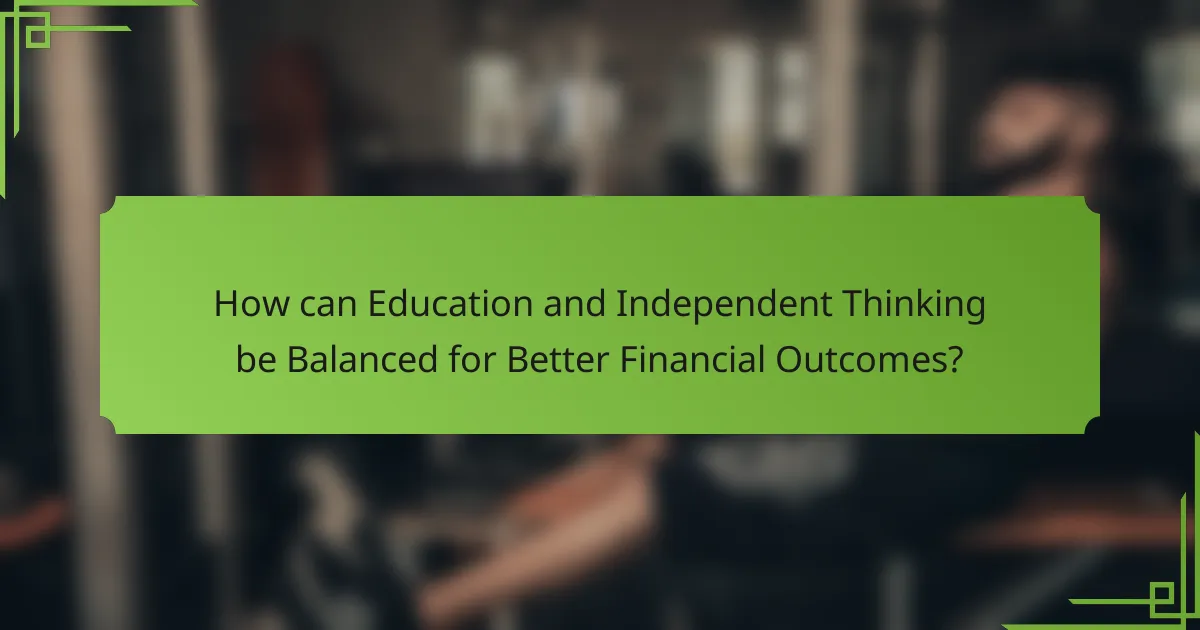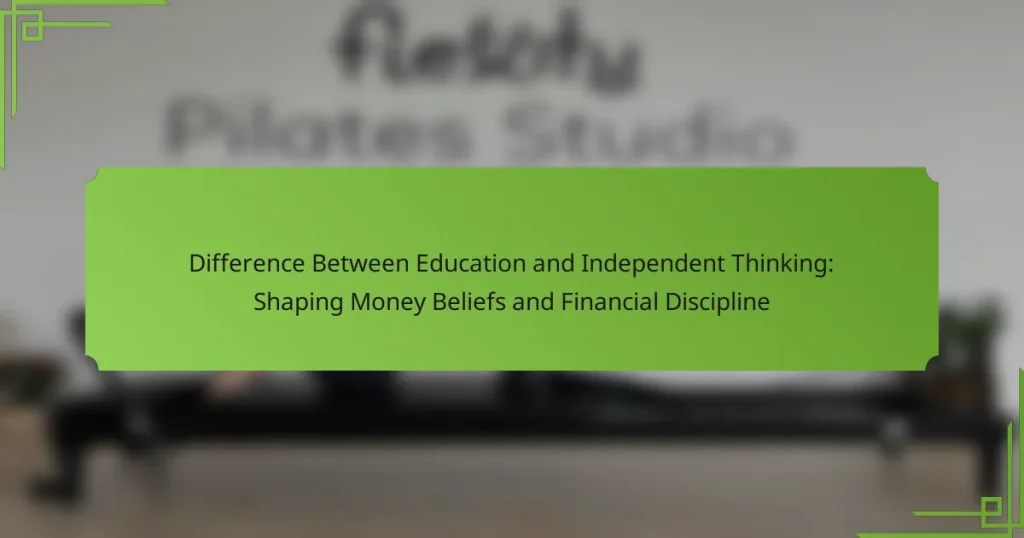Understanding the difference between education and independent thinking is crucial for shaping effective money beliefs and fostering financial discipline. Education offers foundational knowledge about financial principles, while independent thinking encourages critical analysis of these concepts. This article explores how educational backgrounds influence informed decision-making, how independent thinkers challenge conventional norms, and the importance of balancing both for better financial outcomes. By examining these dynamics, individuals can enhance their financial management strategies and cultivate disciplined spending habits.

How do Education and Independent Thinking Influence Money Beliefs?
Education and independent thinking significantly shape money beliefs and financial discipline. Education provides foundational knowledge about finances, while independent thinking fosters critical analysis of financial concepts.
Individuals with strong educational backgrounds often understand economic principles, budgeting, and investment strategies. They tend to make informed decisions, reducing impulsive spending. Conversely, independent thinkers challenge conventional financial norms, leading to unique money beliefs.
For example, someone educated in finance may prioritise saving, while an independent thinker might advocate for investing in experiences over material possessions. This diversity in perspectives influences overall financial behaviour and discipline.
Ultimately, the interplay between education and independent thinking creates a spectrum of money beliefs, impacting how individuals manage their finances.
What are the key differences between formal education and independent thinking in financial contexts?
Formal education provides structured knowledge and frameworks, while independent thinking encourages personal judgment and adaptability in financial contexts. Formal education often emphasises standardised curricula, whereas independent thinking fosters creative problem-solving and critical analysis. The former may limit perspectives, while the latter promotes diverse viewpoints. Formal education typically focuses on theories and historical data, while independent thinking allows for real-time decision-making based on current trends. Ultimately, balancing both approaches can enhance financial discipline and informed money beliefs.
Why is independent thinking crucial for developing healthy money beliefs?
Independent thinking is crucial for developing healthy money beliefs because it fosters critical evaluation of financial information. This approach enables individuals to discern between societal norms and personal values, leading to informed financial decisions. Independent thinkers are less likely to adopt harmful financial behaviours influenced by external pressures. They cultivate a unique financial mindset that aligns with their goals, promoting long-term financial discipline. By questioning conventional wisdom, they can identify and embrace values that support sustainable financial health.

What are the Universal Attributes of Money Beliefs?
The universal attributes of money beliefs include perceptions of value, scarcity, and worth. These beliefs shape financial discipline and influence decision-making. Education fosters critical evaluation of these beliefs, while independent thinking encourages personal interpretations. Root attributes like perceived value significantly impact how individuals manage finances. Unique attributes such as cultural influences further differentiate money beliefs across societies.
How do societal norms shape our money beliefs?
Societal norms significantly influence our money beliefs by shaping perceptions of wealth and financial behaviour. These norms dictate what is considered acceptable or desirable regarding spending, saving, and investment. For instance, cultures that prioritise frugality foster beliefs in saving as a virtue, while those that emphasise consumerism may encourage debt accumulation. The unique attribute of these norms is their ability to create a collective mindset that affects individual financial decisions. As a result, understanding societal influences can enhance financial discipline and promote independent thinking in money management.
What role does family upbringing play in financial discipline?
Family upbringing significantly influences financial discipline by shaping money beliefs and behaviours. Children learn financial values through parental modelling, communication, and expectations. For instance, families that prioritise saving and budgeting instil these habits in their children, fostering a sense of responsibility towards money. Research indicates that children exposed to positive financial practices are more likely to develop sound financial skills as adults. This upbringing serves as a root attribute in establishing lifelong financial discipline.

What Unique Attributes Distinguish Independent Thinkers in Finance?
Independent thinkers in finance are distinguished by their unique attributes such as critical analysis, adaptability, and unconventional problem-solving. These qualities enable them to challenge traditional beliefs and develop personalised money management strategies.
Critical analysis allows independent thinkers to evaluate financial information deeply, identifying trends and potential pitfalls that others may overlook. Adaptability is crucial in a constantly changing financial landscape, enabling these individuals to pivot strategies based on new data or market conditions. Unconventional problem-solving fosters innovative approaches to financial challenges, often leading to unique investment opportunities or cost-saving measures.
These attributes contribute to a distinctive mindset that prioritises informed decision-making over rote adherence to established norms. Independent thinkers often cultivate a strong sense of financial discipline, driven by their personal values and beliefs rather than societal expectations.
How do independent thinkers approach risk differently than those reliant on education?
Independent thinkers approach risk with a more flexible mindset compared to those reliant on education. They tend to evaluate situations based on personal experience and intuition rather than solely on theoretical knowledge. This unique approach allows them to adapt quickly to changing circumstances, often leading to innovative solutions. In contrast, individuals reliant on education may adhere strictly to established guidelines, which can limit their ability to navigate uncertainty effectively. Independent thinkers often embrace calculated risks, viewing failures as learning opportunities, while education-dependent individuals may perceive risks as threats to be avoided.
What are the benefits of self-education in financial literacy?
Self-education in financial literacy fosters independence and critical thinking, enhancing money management skills. It promotes informed decision-making, allowing individuals to develop personalised financial strategies. Increased financial literacy leads to better budgeting, investment choices, and long-term wealth accumulation. Moreover, self-education cultivates a growth mindset, encouraging continuous learning and adaptability in changing economic environments.

What are the Rare Attributes of Effective Money Management?
Effective money management relies on rare attributes that distinguish successful individuals. These include emotional intelligence, adaptability to changing financial landscapes, and a proactive approach to learning. Emotional intelligence enables individuals to manage stress and make informed decisions under pressure. Adaptability allows for strategic shifts in response to market fluctuations. A proactive learning approach fosters continuous improvement in financial literacy, enhancing decision-making capabilities. These attributes collectively shape robust money beliefs and instil financial discipline.
What uncommon strategies do independent thinkers use to achieve financial discipline?
Independent thinkers often adopt unconventional strategies for financial discipline, such as prioritising value-driven spending and leveraging creative budgeting methods. These approaches emphasise personal values over societal expectations, leading to unique financial habits. For instance, they may create personalised savings challenges that align with their goals, fostering a deeper connection to their financial choices. Additionally, independent thinkers frequently utilise community resources, like skill-sharing or bartering, to minimise expenses while enhancing their financial resilience. This mindset promotes a sustainable approach to managing money, focusing on long-term stability rather than short-term gratification.
How can unconventional money beliefs lead to innovative financial solutions?
Unconventional money beliefs can foster innovative financial solutions by encouraging creativity and challenging traditional norms. By embracing independent thinking, individuals may identify unique investment opportunities and develop personalised budgeting strategies. This approach often leads to greater financial resilience and adaptability in changing economic landscapes. As a result, unconventional beliefs can transform financial discipline into a dynamic process, promoting continuous learning and improvement.

How can Education and Independent Thinking be Balanced for Better Financial Outcomes?
Education and independent thinking can be balanced for better financial outcomes by integrating structured learning with personal insights. Education provides foundational knowledge about financial principles, while independent thinking fosters adaptability and innovation in applying that knowledge.
Effective financial discipline emerges when individuals can critically assess information, challenge conventional wisdom, and make informed decisions. For instance, understanding budgeting techniques through education can be enhanced by personal experiences that highlight unique spending habits.
Additionally, cultivating independent thinking encourages individuals to evaluate financial advice critically, leading to tailored strategies that align with their values and goals. This balance ultimately promotes a proactive approach to financial management and wealth-building.
What practical steps can individuals take to integrate both approaches?
To integrate education and independent thinking in shaping money beliefs and financial discipline, individuals should adopt a balanced approach. First, actively seek knowledge through formal education, which provides foundational financial concepts. Next, practice independent thinking by critically analysing personal financial situations and decisions. Regularly reflect on experiences to develop a personal financial philosophy. Additionally, engage in discussions with diverse perspectives to challenge existing beliefs and enhance understanding. Finally, implement learned strategies in real-life scenarios, adjusting as necessary to foster financial discipline.
What resources are available for developing independent financial thinking?
To develop independent financial thinking, utilise resources like books, online courses, podcasts, and financial blogs. These tools enhance money beliefs and promote financial discipline. Books such as “The Millionaire Next Door” provide insights into wealth-building habits. Online courses on platforms like Coursera offer structured learning on personal finance. Podcasts featuring financial experts share real-life experiences and strategies. Financial blogs often provide updated advice and tips, making them valuable for continuous learning.
How can mentorship enhance both education and independent thinking?
Mentorship enhances education and independent thinking by providing guidance, fostering critical analysis, and encouraging personal growth. Mentors help individuals question established beliefs, leading to improved financial discipline. This relationship cultivates a unique attribute of self-directed learning, allowing mentees to develop their money beliefs independently while benefiting from experienced insights. As a result, mentorship becomes a powerful tool in shaping financial literacy and responsible decision-making.

What are Common Mistakes to Avoid in Shaping Money Beliefs?
Common mistakes in shaping money beliefs include relying solely on education, ignoring independent thinking, and failing to challenge inherited beliefs. Education can provide knowledge, but independent thinking fosters personal financial discipline. Avoid adopting societal norms without critical evaluation. Recognise that emotional influences often distort financial decisions. Additionally, neglecting to set clear financial goals can lead to misguided beliefs. Emphasising self-reflection and questioning assumptions strengthens financial understanding and discipline.
How can reliance on traditional education hinder financial growth?
Reliance on traditional education can limit financial growth by promoting conformity over independent thinking. Traditional education often emphasises rote learning and standardised testing, which can stifle creativity and critical thinking. As a result, individuals may adopt conventional money beliefs that hinder innovation and risk-taking in financial decisions. This lack of financial discipline can prevent them from exploring alternative investment strategies or entrepreneurial ventures, ultimately restricting their financial potential. Embracing independent thinking fosters adaptability and proactive financial management, essential for navigating today’s dynamic economic landscape.
What pitfalls do independent thinkers face in their financial journeys?
Independent thinkers often face challenges in their financial journeys due to a lack of conventional guidance. They may struggle with self-doubt, questioning traditional money beliefs. This can lead to inconsistent financial discipline, as they may prioritise innovative approaches over proven strategies. Additionally, independent thinkers might encounter isolation, lacking a supportive network for financial advice. They may also resist seeking professional help, believing in their ability to navigate finances alone, which can result in costly mistakes.

What Best Practices Can Enhance Financial Discipline?
To enhance financial discipline, individuals should prioritise education and independent thinking. These practices shape money beliefs and foster better financial decision-making.
First, develop a strong foundation in financial literacy. Understanding concepts like budgeting, saving, and investing equips individuals to make informed choices.
Next, cultivate independent thinking by questioning societal norms around money. This encourages critical analysis of personal financial habits and beliefs, leading to more disciplined spending and saving behaviours.
Additionally, set clear financial goals. Specific, measurable objectives provide motivation and a framework for tracking progress, reinforcing disciplined financial practices.
Lastly, regularly review and adjust financial plans. Continuous evaluation allows for adaptability and ensures alignment with evolving financial circumstances and goals.
What actionable tips can help individuals develop a balanced approach to money beliefs?
To develop a balanced approach to money beliefs, individuals should prioritise education and independent thinking. Start by critically assessing existing beliefs and identifying influences. Next, seek diverse financial education resources to enhance understanding. Regularly practise budgeting to reinforce discipline. Engage in discussions with others to challenge perspectives. Finally, reflect on personal experiences to cultivate a unique financial mindset.
How can setting personal financial goals improve discipline and beliefs?
Setting personal financial goals enhances discipline and beliefs by providing clear targets and fostering accountability. This structured approach encourages individuals to develop habits that align with their financial aspirations. As a result, consistent goal-setting can reshape attitudes towards money, reinforcing positive beliefs about financial management. Research indicates that individuals with specific financial objectives are more likely to exhibit disciplined spending and saving behaviours, ultimately leading to improved financial well-being.




